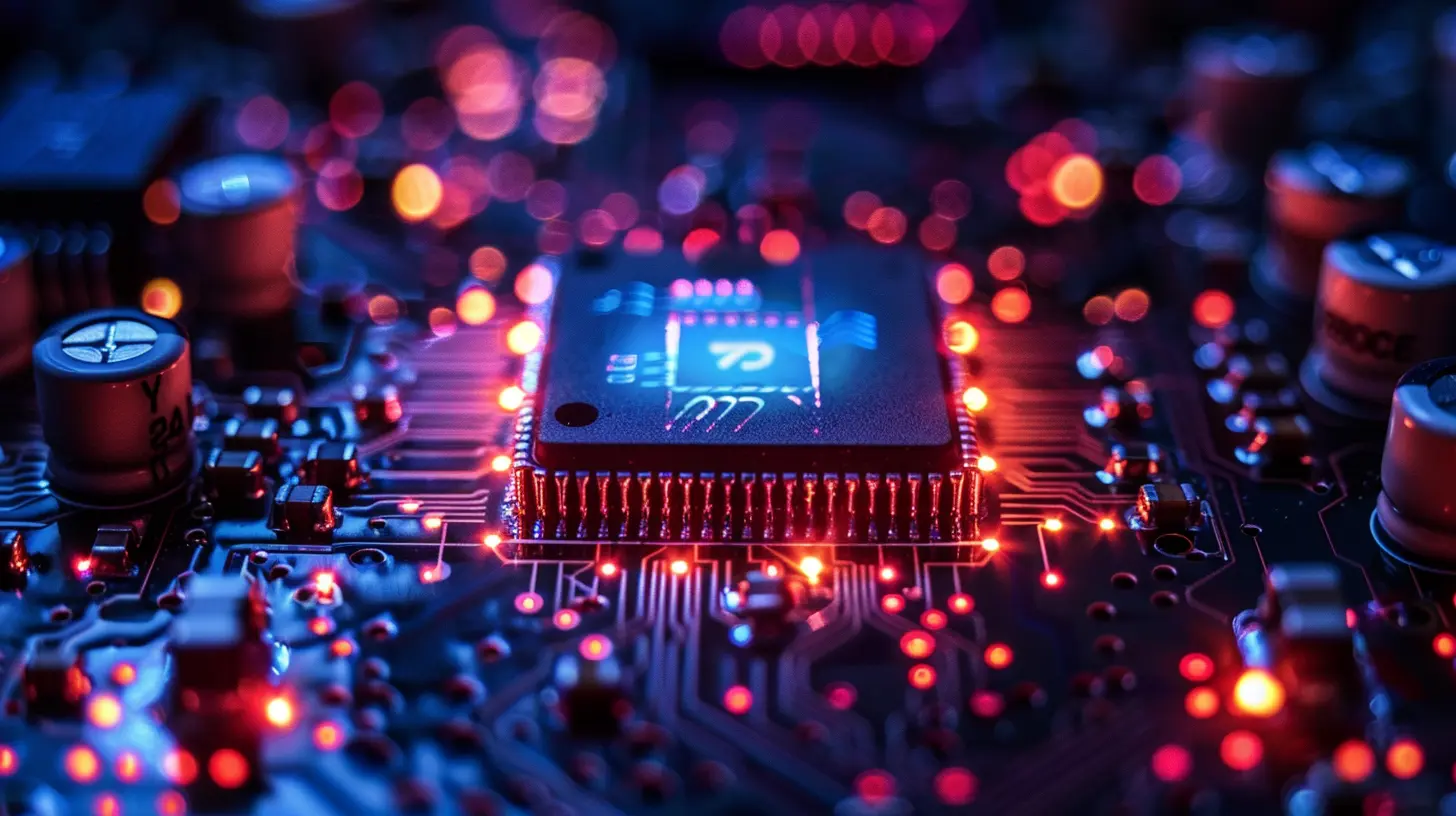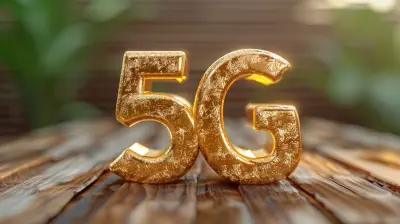The Role of Quantum Sensors in the Gadgets of Tomorrow
23 May 2025
Technology is advancing at a breakneck pace, and every day it feels like we're on the verge of something revolutionary. Remember when smartphones were groundbreaking? Now, they’re just a given. But here's the thing: We might be standing on the edge of another massive leap, and this time it’s all thanks to quantum sensors. These tiny, futuristic devices could be the real game-changer in the gadgets of tomorrow. But what exactly are quantum sensors, and why is everyone so excited about them? Let’s dive in.

What Are Quantum Sensors?
Before we jump into how quantum sensors might fit into the gadgets of the future, let’s first break down what they are. In the simplest terms, quantum sensors are devices that use the principles of quantum mechanics to measure physical quantities with extraordinary precision.It sounds like science fiction, but it’s real. Quantum mechanics deals with the behavior of particles at atomic and subatomic scales. In this bizarre world, particles can be in multiple places at once, and they can “talk” to each other even when separated by huge distances (cue the spooky music). Quantum sensors tap into these strange but powerful properties to measure things like time, gravity, temperature, and magnetic fields with extreme accuracy.
A Quick Analogy: Think of It Like Super Senses
Imagine your traditional sensors, like the accelerometer in your smartphone that detects how fast you're moving. Now, imagine if your phone could detect movement on a scale so tiny it could pick up the flutter of a butterfly’s wings from miles away. That’s the sort of heightened sensitivity we’re talking about with quantum sensors.
How Do Quantum Sensors Work?
Without getting too deep into the physics, quantum sensors rely on quantum phenomena such as superposition and entanglement.1. Superposition: In the quantum world, particles can exist in multiple states at once. A quantum sensor can take advantage of this to measure multiple variables simultaneously with extreme precision.
2. Entanglement: This is the "spooky action at a distance" that Einstein famously referred to. When particles are entangled, changes to one particle can instantly affect another, no matter how far apart they are. This phenomenon allows quantum sensors to communicate and share data in ways that classical sensors simply can’t.
By leveraging these properties, quantum sensors can detect minute changes in their environment, providing data that is far more accurate than what we can currently achieve with traditional sensors.

Where Might We See Quantum Sensors?
So, now that we know what quantum sensors are and how they work, the next question is: where will we see them? The answer is – everywhere. Quantum sensors could find their way into all sorts of gadgets and devices, impacting industries ranging from healthcare to transportation to entertainment. Below are some of the most exciting potential applications.1. Smartphones & Wearables
Can you imagine what a smartphone with quantum sensors could do? For starters, it could take your GPS accuracy to a whole new level. Instead of knowing your location within a few meters, quantum sensors could pinpoint where you're standing with centimeter-level accuracy. This could revolutionize everything from navigation apps to augmented reality (AR) games.Wearables, like smartwatches, could also benefit. Quantum sensors could provide highly accurate health data, potentially detecting even the smallest changes in your body. Imagine a smartwatch that can predict a heart attack before it happens or monitor your blood sugar levels without needing to draw blood. That’s the kind of future we’re talking about here.
2. Autonomous Vehicles
Autonomous vehicles are already on the horizon, but they still face some significant challenges—especially when it comes to sensors. Current self-driving cars rely on a combination of cameras, radar, and LiDAR to navigate the world. While these technologies work well most of the time, they can struggle in certain conditions, like fog or heavy rain.Quantum sensors could solve this problem. By providing more precise measurements of the car’s surroundings, they could make autonomous vehicles safer and more reliable. Imagine a car that can “see” even in the densest fog or detect the tiniest obstacles in the road. That’s the power of quantum sensing.
3. Healthcare Devices
We’ve already mentioned wearables, but the potential benefits of quantum sensors in healthcare go beyond just smartwatches. Quantum technology could lead to the development of medical devices that can detect diseases at much earlier stages. For example, quantum sensors could be used in imaging devices to detect cancer cells before they form a tumor.It’s not just about early detection, either. Quantum sensors could also improve the accuracy of treatments. For example, they could help doctors target cancer cells with greater precision during radiation therapy, reducing damage to surrounding healthy tissue.
4. Environmental Monitoring
Climate change is one of the biggest challenges facing our planet, and quantum sensors could help in the fight against it. Because they are so sensitive, quantum sensors could be used to detect even the smallest changes in the environment, such as shifts in temperature or air quality.For example, they could be used in weather stations to provide more accurate forecasts, giving people more time to prepare for extreme weather events. They could also be used in smart cities to monitor pollution levels in real-time, helping city planners take action to improve air quality.
5. Gaming and Virtual Reality
If you thought gaming was immersive now, just wait until quantum sensors get involved. These sensors could take motion tracking to the next level, making virtual reality experiences feel even more lifelike. Imagine playing a VR game where your movements are tracked with such precision that it feels like you're really there. Every flick of your wrist, every turn of your head, could be captured in real-time with zero lag. That’s the kind of next-gen gaming experience quantum sensors could bring.6. Security and Encryption
Quantum sensors could also play a huge role in the future of cybersecurity. Quantum encryption is already being researched as a way to protect sensitive data from hackers. Quantum sensors could be used to detect even the slightest tampering with data or communication systems, making it nearly impossible for malicious actors to go unnoticed.This could lead to more secure smartphones, computers, and other gadgets, ensuring that our personal data remains safe in an increasingly digital world.

Challenges and Limitations
Of course, as with any new technology, there are challenges to overcome. Quantum sensors are incredibly sensitive, which is both a blessing and a curse. While they can provide highly accurate data, they’re also more prone to interference from their surroundings. Scientists are working on ways to shield quantum sensors from environmental noise, but it’s a tricky problem to solve.Another challenge is cost. Right now, quantum technology is expensive, and it may take some time before quantum sensors are affordable enough to be used in everyday gadgets. But as we’ve seen with other technologies, prices tend to drop as the technology matures.
The Future of Quantum Sensors
So, when can we expect quantum sensors to start showing up in our gadgets? While some applications, like quantum encryption, are already being developed, it may take a few more years before quantum sensors become a common feature in consumer devices. But make no mistake—quantum sensors are coming, and when they arrive, they’ll bring a whole new level of functionality to our gadgets.We’re standing on the brink of a new technological revolution, one that could change the way we interact with the world around us. Whether it’s more accurate health monitoring, better navigation, or more immersive gaming experiences, quantum sensors have the potential to transform our lives in ways we can’t even fully imagine yet. The future is quantum, and it’s going to be amazing.
Conclusion
As we look toward the future of technology, it's clear that quantum sensors will play a critical role in shaping the gadgets of tomorrow. Their ability to provide unprecedented accuracy and sensitivity will open up new possibilities across a wide range of industries. From healthcare to gaming to autonomous vehicles, quantum sensors will revolutionize the way we interact with technology and the world around us. While there are still challenges to overcome, the potential benefits of quantum sensors are too great to ignore. The countdown to the quantum revolution has already begun—are you ready?all images in this post were generated using AI tools
Category:
Tech TrendsAuthor:

Reese McQuillan
Discussion
rate this article
3 comments
Ivan McLaughlin
Great article! It's fascinating to see how quantum sensors could revolutionize our gadgets, making them smarter and more efficient. Excited to imagine the possibilities they bring for everyday technology. Keep up the great work!
June 8, 2025 at 3:09 AM

Reese McQuillan
Thank you for your kind words! I'm glad you found it fascinating. Exciting times ahead for technology!
Georgia Phelps
What an exciting glimpse into the future! Quantum sensors promise to revolutionize our gadgets, bringing incredible precision and new possibilities. Can't wait to see what’s next! 🛸✨
May 24, 2025 at 11:16 AM

Reese McQuillan
Thank you! I share your excitement about the transformative potential of quantum sensors in our future gadgets!
Fallon Sweeney
This article highlights an exciting frontier in technology. Quantum sensors promise to revolutionize our gadgets, enhancing precision and capabilities in ways we’re just beginning to understand.
May 23, 2025 at 3:14 AM

Reese McQuillan
Thank you! I'm glad you found the potential of quantum sensors exciting—it's truly a fascinating area with so much to explore!



